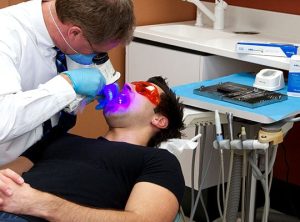Our Long Island Periodontists Can Help Stop Gingivitis in Its Tracks
Gingivitis is one of the most common and early stages of gum disease, affecting millions of people worldwide. If left untreated, it can lead to more severe forms of periodontal disease, including periodontitis, which can result in tooth loss and other serious health complications.
At Farber Center of Periodontics and Dental Implants, our experienced team, led by board-certified periodontists with decades of expertise, specializes in the diagnosis, prevention, and treatment of gingivitis and all forms of gum disease. To schedule an appointment, contact our Hauppauge dental office at 631-268-4859 or our Medford dental office at 631-238-4968.
What Is Gingivitis?
Gingivitis is the mildest form of periodontal disease, characterized by inflammation and irritation of the gums. It occurs when plaque, a sticky film of bacteria, builds up on the teeth and along the gumline. If not removed through proper brushing and flossing, the plaque hardens into tartar, leading to gum inflammation.
Gingivitis is reversible with proper oral care and professional treatment. However, when left untreated, it can progress to periodontitis, which can cause irreversible damage to the gums, bones, and teeth.
What Causes Gingivitis?
- Poor Oral Hygiene: Inadequate brushing and flossing allow plaque to build up on your teeth, leading to gum inflammation.
- Tobacco Use: Smoking or using other forms of tobacco impairs gum tissue health and contributes to the accumulation of plaque and tartar.
- Hormonal Changes: Hormonal fluctuations during pregnancy, menstruation, and menopause can make gums more sensitive and prone to inflammation.
- Medications: Some medications can reduce saliva flow, which helps protect the teeth and gums. Dry mouth can increase the risk of plaque buildup.
- Systemic Diseases: Conditions like diabetes, heart disease, and autoimmune disorders can make individuals more susceptible to infections, including gum disease.
- Genetics: Some people may be genetically predisposed to gum disease, making them more vulnerable to developing gingivitis.
- Stress: Chronic stress weakens the immune system, making it harder for the body to fight off infections, including gingivitis.
- Diet: A diet high in sugar and low in essential nutrients like vitamin C can increase the risk of developing gum disease.
Gingivitis Symptoms
Identifying the early signs of gingivitis is crucial for preventing the progression of more serious gum disease. Some common symptoms include:
- Red, Swollen Gums: Healthy gums should be firm and pink. Gingivitis causes them to become red, swollen, and tender.
- Bleeding Gums: Gums that bleed during brushing or flossing are one of the earliest signs of gingivitis.
- Bad Breath: Persistent bad breath, or halitosis, can be a result of the bacteria associated with gum disease.
- Receding Gums: As gingivitis progresses, the gums may start to pull away from the teeth, creating pockets where bacteria can accumulate.
- Tender Gums: Gums may feel sensitive to touch, especially when brushing or eating.
- Tartar Buildup: Plaque that remains on the teeth hardens into tartar, which can only be removed by a dental professional.
If you notice any of these symptoms, contact our periodontists in Long Island for an appointment today. When caught early enough, we can reverse gingivitis symptoms.
Gingivitis Treatment at Farber Center for Periodontics and Dental Implants
Professional Dental Cleaning
One of the first steps in treating gingivitis is a professional dental cleaning, also known as prophylaxis. During this procedure, a dental hygienist will remove plaque and tartar from the teeth, both above and below the gumline. Regular cleanings are essential to preventing the recurrence of gingivitis.
Scaling and Root Planing
For more severe cases of gingivitis, scaling and root planing (deep cleaning) may be necessary. This non-surgical procedure involves:
- Scaling: Removing tartar and plaque from the tooth surface and beneath the gumline.
- Root Planing: Smoothing the root surfaces of the teeth to eliminate bacteria and promote gum reattachment.
This procedure helps reduce pocket depth, preventing bacteria from accumulating and worsening gum disease.
Antibacterial Mouth Rinse
In some cases, your periodontist may recommend an antimicrobial mouth rinse to help reduce bacterial activity and inflammation. Prescription mouthwashes containing chlorhexidine are effective in controlling gingivitis.
Laser Gum Therapy
For patients who prefer a less invasive option, laser gum therapy can be an effective treatment. This advanced technique uses laser energy to remove diseased tissue and bacteria without the need for incisions or stitches. Laser therapy also promotes faster healing and reduces discomfort.
Improved Oral Hygiene Routine
The most important aspect of treating and preventing gingivitis is maintaining excellent oral hygiene. Our team will provide you with personalized instructions on how to brush and floss effectively to prevent plaque buildup. In addition, using an electric toothbrush and interdental brushes can help keep your gums healthy.
Gingivitis Treatment Costs
The costs of gingivitis treatment can vary depending on several factors, including the severity of the condition, the recommended treatment plan, and the geographical location. General cost estimates for common gingivitis treatments are:
- Professional Dental Cleanings: The cost of a routine dental cleaning can range from $75 to $200. However, if there’s a significant buildup of plaque and tartar requiring a deep cleaning, also known as scaling and root planing, the cost can be higher, typically ranging from $200 to $400 per quadrant of the mouth.
- Antibiotic Therapy: In some cases, antibiotics may be prescribed to treat gingivitis. The cost of antibiotics can vary depending on the specific medication prescribed and whether it’s covered by insurance.
- Additional Treatments: If gingivitis has progressed to a more severe stage or if there are other underlying dental issues, additional treatments may be required. These can include periodontal gum surgery, gum grafting, or other specialized procedures. The costs for such treatments can vary significantly.
How to Prevent Gingivitis
Prevention is key to maintaining healthy gums and a beautiful smile. By following these simple steps, you can significantly reduce your risk of developing gingivitis:
- Brush Twice a Day: Use a soft-bristled toothbrush and fluoride toothpaste to brush your teeth for two minutes, focusing on the gumline.
- Floss Daily: Cleaning between your teeth is essential for removing plaque that your toothbrush can’t reach.
- Use Mouthwash: An antimicrobial mouthwash can help kill bacteria and reduce plaque buildup.
- Visit Your Dentist Regularly: Routine dental cleanings and checkups are crucial for catching and treating gingivitis early and maintaining good oral hygiene.
- Maintain a Healthy Diet: A balanced diet rich in vitamins and minerals, especially vitamin C, helps keep your gums strong and healthy.
- Avoid Tobacco: Smoking and using tobacco products significantly increase your risk of gum disease.
- Manage Stress: Reducing stress through relaxation techniques can help support your immune system and overall oral health.
Frequently Asked Questions
Is gingivitis contagious?
No, gingivitis is not contagious. It’s a bacterial infection caused by the buildup of plaque on your teeth and gums, which is only created due to a lack of daily brushing and flossing.
Can gingivitis lead to other health problems?
If left untreated, gingivitis can progress to periodontitis, which can lead to tooth loss and other complications. Additionally, research suggests that gum disease may be linked to systemic health issues such as heart disease, diabetes, and respiratory problems.
Is gingivitis reversible?
Yes, gingivitis is reversible with proper treatment and improved oral hygiene habits. However, if left untreated, gingivitis can progress to a more serious form of gum disease called periodontitis, which can cause permanent damage to your teeth and gums.
How long does it take to treat gingivitis?
The duration of treatment depends on the severity of your condition and how well you follow your periodontist’s instructions. With proper care, most cases of gingivitis can be resolved within a few weeks.
Gingivitis Doesn’t Stand a Chance Against Our Long Island Periodontists
If you’re experiencing symptoms of gingivitis, such as swollen or bleeding gums, schedule an appointment with our experienced and knowledgeable periodontist in Medford and Hauppauge. Our dental team is dedicated to providing high-quality, personalized care to help you prevent and treat periodontal diseases, as well as help you maintain good oral health.
To schedule an appointment, contact our Hauppauge dental office at 631-268-4859 or our Medford dental office at 631-238-4968.
